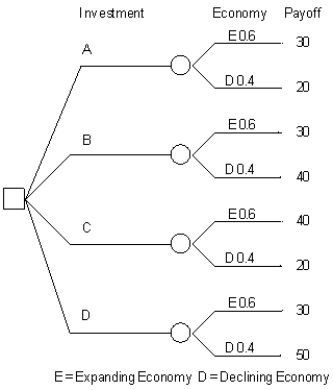Exam 14: Decision Analysis
Exam 1: Introduction to Modeling and Decision Analysis52 Questions
Exam 2: Introduction to Optimization and Linear Programming62 Questions
Exam 3: Modeling and Solving Lp Problems in a Spreadsheet88 Questions
Exam 4: Sensitivity Analysis and the Simplex Method72 Questions
Exam 5: Network Modeling72 Questions
Exam 6: Integer Linear Programming72 Questions
Exam 7: Goal Programming and Multiple Objective Optimization59 Questions
Exam 8: Nonlinear Programming and Evolutionary Optimization68 Questions
Exam 9: Regression Analysis76 Questions
Exam 10: Discriminant Analysis57 Questions
Exam 11: Time Series Forecasting111 Questions
Exam 12: Introduction to Simulation Using Risk Solver Platform65 Questions
Exam 13: Queuing Theory79 Questions
Exam 14: Decision Analysis102 Questions
Exam 15: Project Management Online61 Questions
Select questions type
A convenience store chain is considering opening a new store at one of four locations. They have developed the following multi-criteria scoring model for this problem. Complete the table for this problem. What location should they choose based on this information?

(Essay)
4.8/5  (42)
(42)
Exhibit 14.5
The following questions are based on the information below.
An investor is considering 4 investments, A, B, C, D. The payoff from each investment is a function of the economic climate over the next 2 years. The economy can expand or decline. The following decision tree has been developed for the problem. The investor has estimated the probability of a declining economy at 40% and an expanding economy at 60%.
 -Refer to Exhibit 14.5. What is the correct decision for this investor based on an expected monetary value criteria?
-Refer to Exhibit 14.5. What is the correct decision for this investor based on an expected monetary value criteria?
(Multiple Choice)
4.9/5  (28)
(28)
Exhibit 14.9
The following questions are based on the information below.
An investor is considering 4 investments, W, X, Y, and Z. The payoff from each investment is a function of the economic climate over the next 2 years. The economy can expand or decline. The following payoff matrix has been developed for the investment decision problem.
 -Refer to Exhibit 14.9. Assume the formula =MIN(B5:C5) was entered in cell D5 and copied to cells D6:D8. What formula should go in cell E5 and get copied to cells E6:E8 to place a "<==" to indicate the choice according to the maximin decision rule?
-Refer to Exhibit 14.9. Assume the formula =MIN(B5:C5) was entered in cell D5 and copied to cells D6:D8. What formula should go in cell E5 and get copied to cells E6:E8 to place a "<==" to indicate the choice according to the maximin decision rule?
(Short Answer)
4.7/5  (31)
(31)
An investor is considering 2 investments, A, B, which can be purchased now for $10. There is a 40% chance that investment A will grow rapidly in value and a 60% chance that it will grow slowly. If A grows rapidly the investor can cash it in for $80 or trade it for investment C which has a 25% chance of growing to $100 and a 75% chance of reaching $80. If A grows slowly it is sold for $50. There is a 70% chance that investment B will grow rapidly in value and a 30% chance that it will grow slowly. If B grows rapidly the investor can cash it in for $100 or trade it for investment D which has a 20% chance of growing to $95 and an 80% chance of reaching $80. If B grows slowly it is sold for $45. What is the multistage decision for this investor and what is the EMV for this decision?
(Short Answer)
4.8/5  (46)
(46)
Exhibit 14.9
The following questions are based on the information below.
An investor is considering 4 investments, W, X, Y, and Z. The payoff from each investment is a function of the economic climate over the next 2 years. The economy can expand or decline. The following payoff matrix has been developed for the investment decision problem.
 -Refer to Exhibit 14.9. What decision should be made according to the minimax regret decision rule?
-Refer to Exhibit 14.9. What decision should be made according to the minimax regret decision rule?
(Short Answer)
4.8/5  (40)
(40)
Exhibit 14.5
The following questions are based on the information below.
An investor is considering 4 investments, A, B, C, D. The payoff from each investment is a function of the economic climate over the next 2 years. The economy can expand or decline. The following decision tree has been developed for the problem. The investor has estimated the probability of a declining economy at 40% and an expanding economy at 60%.
 -Refer to Exhibit 14.5. How high can P(E) go before the investor's decision, based on expected monetary value criteria, changes?
-Refer to Exhibit 14.5. How high can P(E) go before the investor's decision, based on expected monetary value criteria, changes?
(Multiple Choice)
4.9/5  (33)
(33)
The decision with the smallest expected opportunity loss (EOL) will also have the
(Multiple Choice)
4.8/5  (40)
(40)
A "risk averse" decision maker assigns the ____ relative utility to any payoff but has a(n) ____ marginal utility for increased payoffs.
(Multiple Choice)
4.9/5  (31)
(31)
Exhibit 14.9
The following questions are based on the information below.
An investor is considering 4 investments, W, X, Y, and Z. The payoff from each investment is a function of the economic climate over the next 2 years. The economy can expand or decline. The following payoff matrix has been developed for the investment decision problem.
 -Refer to Exhibit 14.9. What formula should go in cell D5 and get copied to D6:D8 to implement the maximin decision rule?
-Refer to Exhibit 14.9. What formula should go in cell D5 and get copied to D6:D8 to implement the maximin decision rule?
(Short Answer)
4.7/5  (32)
(32)
A circular node in a decision tree is called a(n) ____ node.
(Multiple Choice)
4.8/5  (35)
(35)
What is the formula for the weighted average score for alternative j when using a multi-criteria scoring model?
(Multiple Choice)
4.9/5  (35)
(35)
A payoff matrix depicts ____ versus ____ with payoffs for each intersection cell.
(Multiple Choice)
4.9/5  (43)
(43)
A fast food restaurant is considering opening a new store at one of four locations. They have developed the following multi-criteria scoring model for this problem. What location should they choose based on this information? 1 Scores 2 Site Site Site Site Criterion 3 Criterion Weights 4 Sales 0.80 0.75 0.70 0.65 0.4 5 Location 0.70 0.80 0.88 0.95 0.3 6 Security 0.40 0.50 0.60 0.50 0.2 7 Growth 0.60 0.60 0.80 0.85 0.1 8 Weighted average score 1
(Multiple Choice)
4.9/5  (34)
(34)
Decision Analysis techniques provide modeling techniques to help decision makers make decisions. Which of the following is not typically a benefit of decision analysis?
(Multiple Choice)
4.8/5  (40)
(40)
Exhibit 14.6
The following questions use the information below.
A company is planning a plant expansion. They can build a large or small plant. The payoffs for the plant depend on the level of consumer demand for the company's products. The company believes that there is an 69% chance that demand for their products will be high and a 31% chance that it will be low. The company can pay a market research firm to survey consumer attitudes towards the company's products. There is a 63% chance that the customers will like the products and a 37% chance that they won't. The payoff matrix and costs of the two plants are listed below. The company believes that if the survey is favorable there is a 92% chance that demand will be high for the products. If the survey is unfavorable there is only a 30% chance that the demand will be high. The following decision tree has been built for this problem. The company has computed that the expected monetary value of the best decision without sample information is 154.35 million. The company has developed the following conditional probability table for their decision problem.
 -Refer to Exhibit 14.6. What formula should go in cell C13 of the probability table?
-Refer to Exhibit 14.6. What formula should go in cell C13 of the probability table?
(Multiple Choice)
4.9/5  (42)
(42)
The decision rule which selects the alternative associated with the smallest maximum opportunity loss is the
(Multiple Choice)
4.8/5  (37)
(37)
Exhibit 14.13
The following questions use the information below.
A student wants to buy a new car. She has three cars to choose from, A, B and C. The cars differ with respect to price, performance and looks. The student has developed the following AHP tables for price and summary. The other tables are not shown due to space limitations.

 -Refer to Exhibit 14.13. What formula should go in cell F11 and copied to cells F12:F13 of the Price worksheet to compute the Price Score?
-Refer to Exhibit 14.13. What formula should go in cell F11 and copied to cells F12:F13 of the Price worksheet to compute the Price Score?
(Short Answer)
4.9/5  (39)
(39)
Showing 81 - 100 of 102
Filters
- Essay(0)
- Multiple Choice(0)
- Short Answer(0)
- True False(0)
- Matching(0)